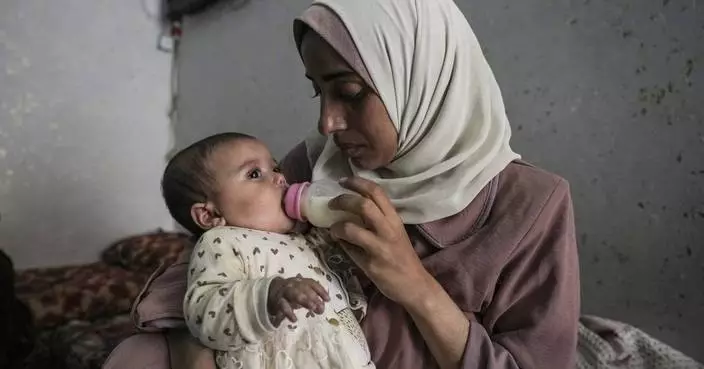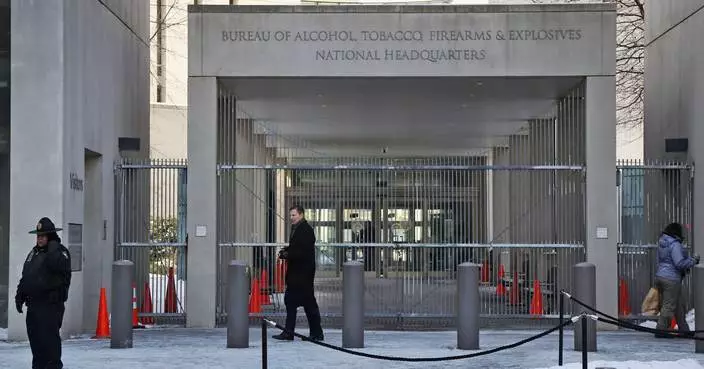Lauren's sibling Ebony gave her the greatest gift of all – a daughter.
After an emotional four-year journey, a woman who feared pregnancy would kill her has finally become a mum – thanks to her sister, who gave birth to her.
Click to Gallery
Lauren's sibling Ebony gave her the greatest gift of all – a daughter.
Lauren Hooper, 31, and her husband Michael, 36, of Okehampton, Devon, met their little girl Rae when she was born last month on July 24, after nine months inside Lauren's sister Ebony Hutt's womb.
Ebony became pregnant after the third round of IVF (Collect/PA Real Life)
Lauren (left) and Ebony (Collect/PA Real Life)
But, just when the couple thought all hope of becoming parents was lost, Ebony, 35, offered, in the ultimate act of selflessness, to act as a surrogate.
Lauren and Michael on their wedding day (Collect/PA Real Life)
When Lauren was first born on May 2, 1987, doctors believed that she was terminally ill after they discovered her heart wasn't pumping properly.
The couple's first cycle of IVF, which they got through the NHS, resulted in three embryos – and three shots at parenthood.
Lauren and Michael with their scan picture (Collect/PA Real Life)
But after gathering £15,000, via a crowdfunding page and a string of fundraising events, to have the entire procedure done again privately, another embryo – which this time was the only one from the IVF cycle – was implanted in November 2017. Luckily this time, Ebony's bump started to grow.
After a straightforward pregnancy, the final few weeks were the most difficult as, at 35 weeks, a scan detected the baby was breech – in a bottom or feet the first position.
At 38 weeks, on July 23, with baby Rae still in the wrong position, doctors decided to turn her then hold her in place and break Ebony's waters.
Ebony being monitored (Collect/PA Real Life)
"Our whole family was waiting to meet her and it was so special. Her cousins – Ebony and Gavin's kids – Tegan, nine and Sonny, six, got to meet her first. They've always known that this is their little cousin," said Lauren.
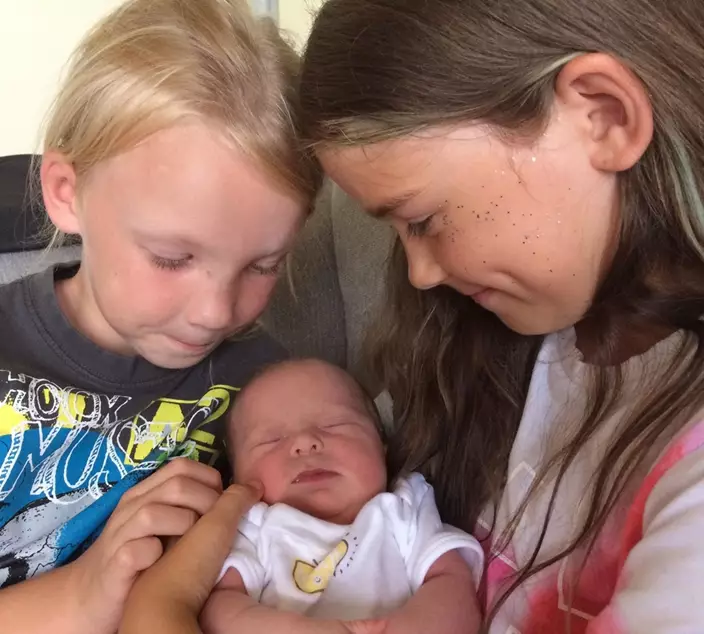
Ebony's children Tegan and Sonny meeting Rae (Collect/PA Real Life)
Lauren Hooper, 31, and her husband Michael, 36, of Okehampton, Devon, met their little girl Rae when she was born last month on July 24, after nine months inside Lauren's sister Ebony Hutt's womb.
Four years ago, Lauren was devastated to be told that, because she'd been born with a hole in her heart, a malformation of the pulmonary artery and collateral arteries to the lungs, carrying a child could be fatal for her and her baby.
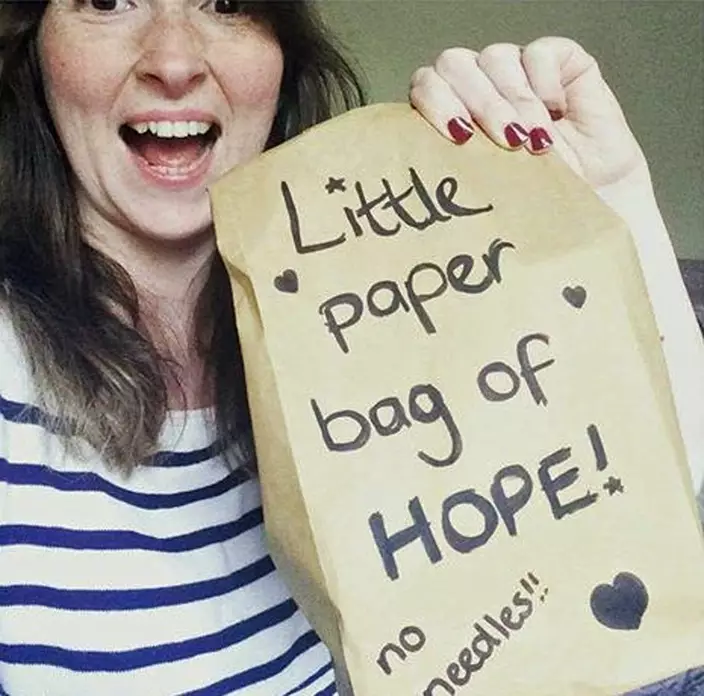
Ebony gave Lauren and Michael a litte tub of her urine so they could perform the pregnancy test (Collect/PA Real Life)

Ebony became pregnant after the third round of IVF (Collect/PA Real Life)
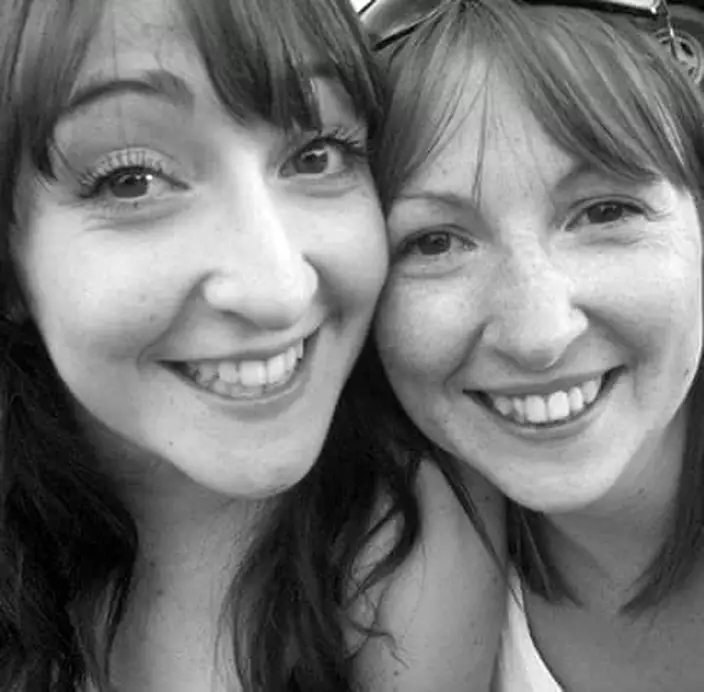
Lauren (left) and Ebony (Collect/PA Real Life)
But, just when the couple thought all hope of becoming parents was lost, Ebony, 35, offered, in the ultimate act of selflessness, to act as a surrogate.
After three failed implantation attempts, she fell pregnant at the end of 2017, and, last month, gave birth to her niece, Rae Ebony Ann Hooper.
New mum Lauren said: "This has been an incredible journey. We didn't know if we would ever become parents, and then Ebony made her incredible offer."
She added: "It's been a difficult process but one that has brought us closer. I am so glad I could do this with my sister."
"We're so in love with our little girl and auntie Ebony will always be very special to her."
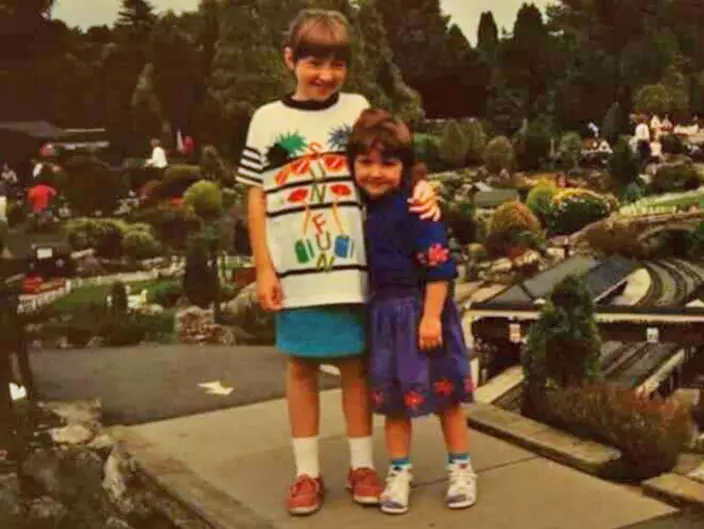
Lauren and Ebony as children (Collect/PA Real Life)
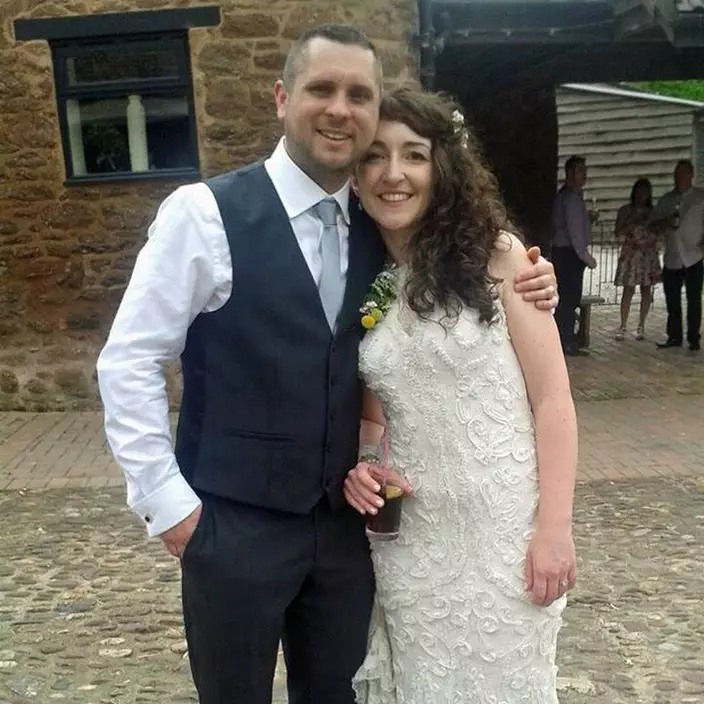
Lauren and Michael on their wedding day (Collect/PA Real Life)
When Lauren was first born on May 2, 1987, doctors believed that she was terminally ill after they discovered her heart wasn't pumping properly.
But, amazingly, she survived and, aged 10, underwent four open heart surgeries.
After meeting Michael through friends in 2010, the pair got engaged 2011.
Casually mentioning her forthcoming nuptials at an annual medical check-up, her consultant asked if the husband-and-wife-to-be were thinking about having children – before breaking the news that her heart was unlikely to cope with pregnancy.
"We weren't trying to have kids at the time, but I knew I wanted to have them at some point in the future. I loved being an auntie to Ebony’s kids and knew I wanted my own someday," Lauren said.
But, when Lauren and Michael, who went on to went on to marry in a beautiful ceremony in Willand, near Exeter, in 2014, told their families, Ebony made her astonishing offer.
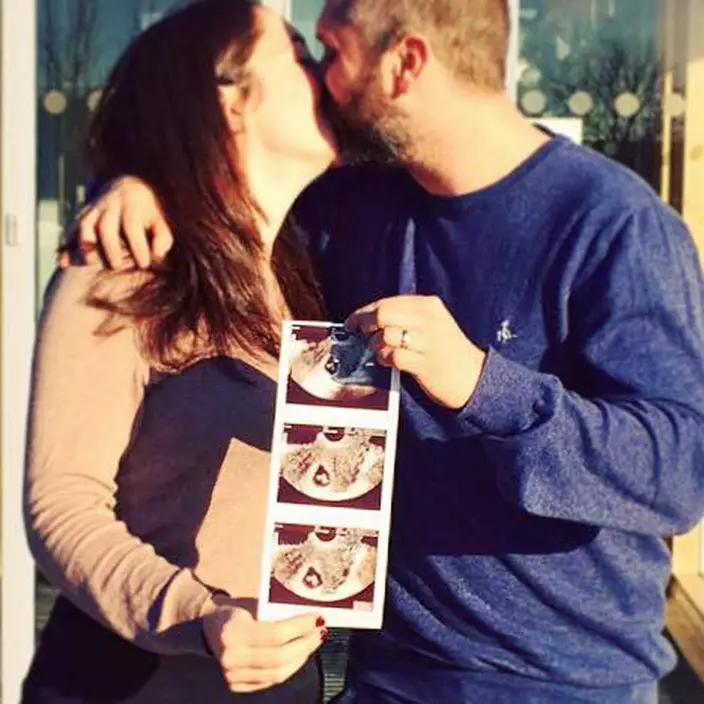
Lauren and Michael with their scan picture (Collect/PA Real Life)
The couple's first cycle of IVF, which they got through the NHS, resulted in three embryos – and three shots at parenthood.
The first implantation took place in April 2016, but sadly Ebony suffered a chemical pregnancy, where the embryo falls away within the first few weeks.
They suffered further heartbreak when the second embryo implantation was unsuccessful before the third resulted in another chemical pregnancy in January 2017.
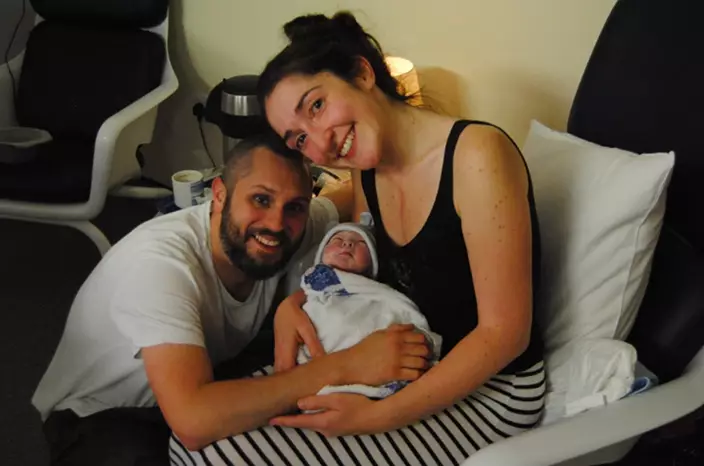
New parents Lauren and Michael with Rae (Collect/PA Real Life)

Lauren and Michael with their scan picture (Collect/PA Real Life)
But after gathering £15,000, via a crowdfunding page and a string of fundraising events, to have the entire procedure done again privately, another embryo – which this time was the only one from the IVF cycle – was implanted in November 2017. Luckily this time, Ebony's bump started to grow.
Lauren, who waited until the birth to find out the sex of the baby, said: "Ebony was carrying our baby, but she did so much to make sure we were involved."
"She was always sending us things and even at the beginning, she gave us a pot of her urine so we could do the pregnancy test and find out first."
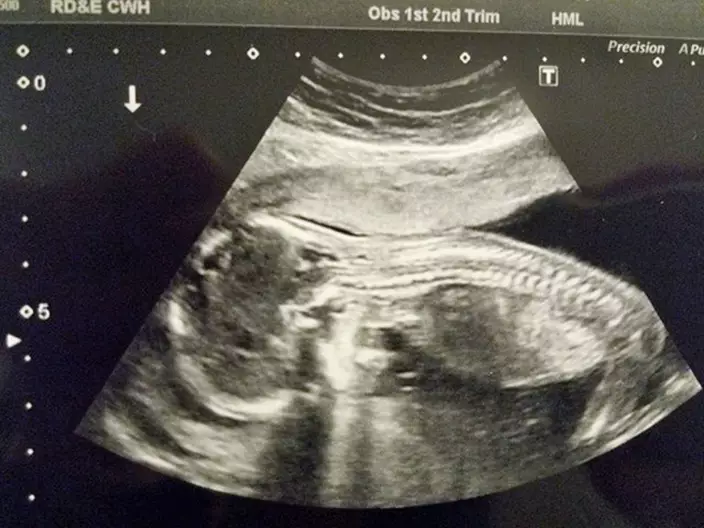
A scan of the baby (Collect/PA Real Life)
After a straightforward pregnancy, the final few weeks were the most difficult as, at 35 weeks, a scan detected the baby was breech – in a bottom or feet the first position.
When she still hadn't shifted at 37 weeks, medics told them they would need to move the baby.
They managed to get her into a head-first position – but within 10 minutes, she moved back, prompting medics to admit Ebony to Royal Devon and Exeter Hospital, where they could keep a close eye on her.
Lauren continued: "Our medical team were fantastic throughout and they were with us every step of the way. They decided that because the baby had moved again, we live 25 miles from the hospital and this is such a precious baby, Ebony should be admitted."
She continued: "They couldn’t risk her going into labour far away from the hospital with a breech baby."
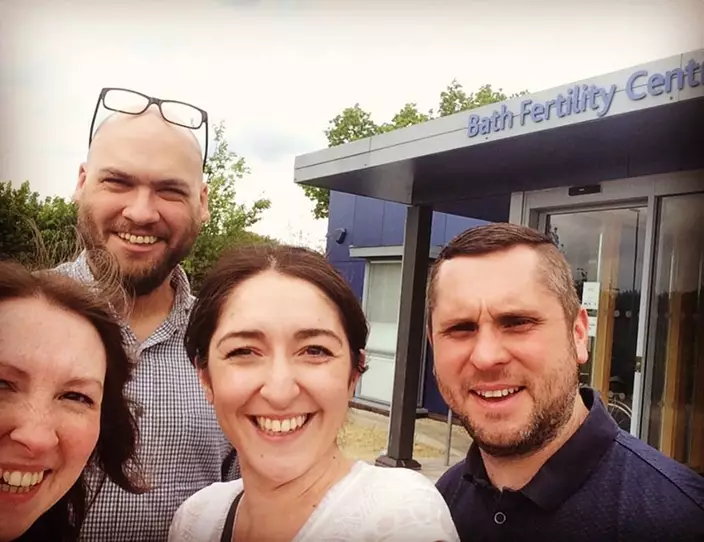
Lauren, Ebony, Michael and Gavin (Collect/PA Real Life)
At 38 weeks, on July 23, with baby Rae still in the wrong position, doctors decided to turn her then hold her in place and break Ebony's waters.
Speaking of the 12-hour labour, Lauren recalled: "We were joking that July 23 was our cousin's birthday, so it'd be nice for Rae to be born the same day."
She continued: "Ebony was pushing and pushing. I looked at the time and it was 11.53pm. I said, 'You've got five minutes. Come on.' She was born at exactly midnight so she just missed it by seconds.
"She had a little knot in her umbilical cord, which is apparently very rare but a sign of good luck. It just felt like it was all meant to be."
Surrounded by Lauren, Michael and her partner, graphic designer Gavin, 41, Ebony gave birth to Rae, who weighed 6lb 12oz, and passed her straight into Lauren’s arms, with Michael cutting the umbilical cord.
Lauren laughed: "It felt like a dream. We had been picturing that moment for years, and she was finally there."
"Poor Ebony was so tired she couldn’t even cry. It was absolutely perfect though. We were all there, helping and holding each other’s hands."
Because of the long labour, doctors took Rae to the neonatal unit to make sure her brain had not been starved of oxygen.
She was monitored for around six hours, before being declared perfectly healthy.
From there, she was sent back to the family's private neonatal room, where Lauren and Michael held and fed their girl for the first time, while Ebony slept in a separate room.
Later that afternoon, with Ebony already discharged, Lauren and Michael took their little girl home for the first time.
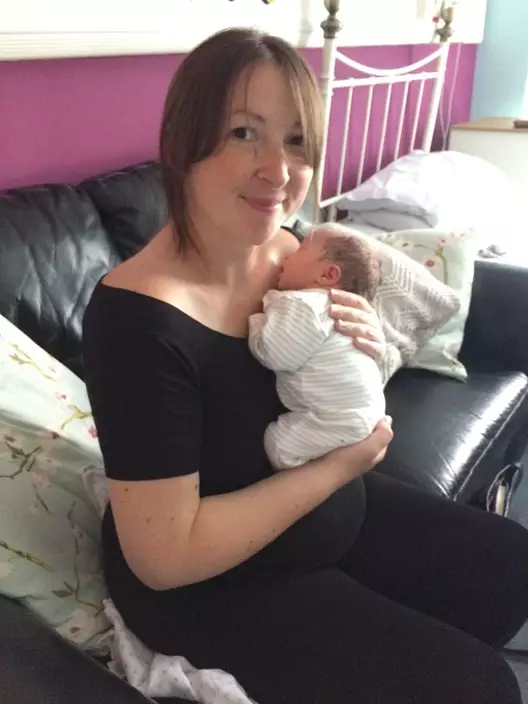
Ebony and Rae (Collect/PA Real Life)
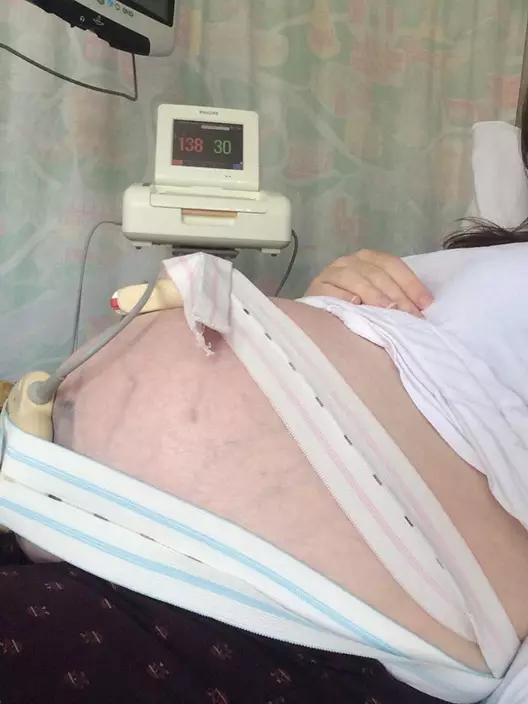
Ebony being monitored (Collect/PA Real Life)
"Our whole family was waiting to meet her and it was so special. Her cousins – Ebony and Gavin's kids – Tegan, nine and Sonny, six, got to meet her first. They've always known that this is their little cousin," said Lauren.
"Ebony is expressing milk for her. She does it at home and then Gavin drops it around every day to make sure she's getting the antibodies. I'm not sure how long that will last but we'll do it for as long as Ebony can."
Now starting the legal process to become Rae's official parents, as the law states that the woman who gives birth is the baby’s mother, Ebony and Lauren believe surrogacy is a very special thing.
Lauren said: "Ebony said she would do it all over again but I’m not sure we want to do it again. It is partly because of the cost but even if we did have the money, I don't know if I would want to put her through it again. We are just counting our lucky stars that we have Rae."
"We will be forever grateful to Ebony for everything."
Ebony said: "As I came to the end of the pregnancy and it became more complicated, I was a little bit worried, but we had come so far. We just had to get through those last few weeks."
She continued: "It was a difficult labour and very different from my labours with my children, as I had never been induced before. Having Lauren, Michael and Gavin with me to support me was amazing. We did a lot of laughing throughout the labour and that is what got me through."
"This has always been Lauren and Michael’s baby and I’ve always known that in my head. The minute she was born, I just wanted her to be with Lauren and Michael. Seeing her with them was so special, and that was the thing I always wanted and the reason I did this. We'll always have a special bond but I am just enjoying being her auntie."
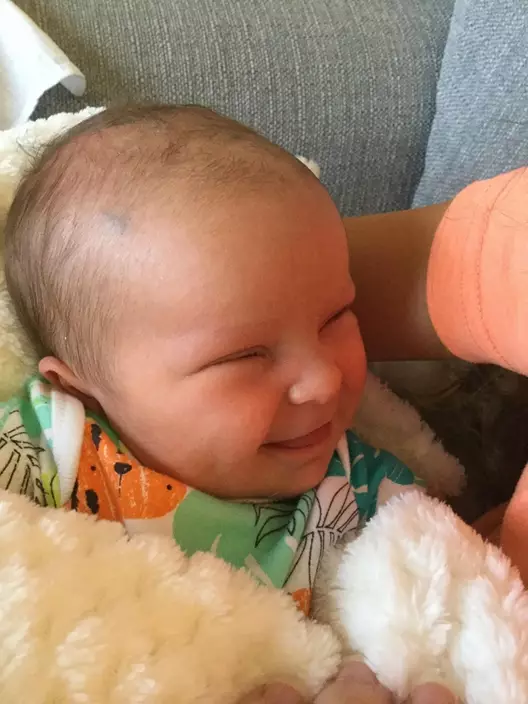
Baby Rae (Collect/PA Real Life)
"I know Lauren and Michael aren't sure they would ever do it again, but it has been a really positive experience for me and I would have no doubts about being a surrogate again if they wanted me to be."
WASHINGTON (AP) — One woman miscarried in the lobby restroom of a Texas emergency room as front desk staff refused to check her in. Another woman learned that her fetus had no heartbeat at a Florida hospital, the day after a security guard turned her away from the facility. And in North Carolina, a woman gave birth in a car after an emergency room couldn't offer an ultrasound. The baby later died.
Complaints that pregnant women were turned away from U.S. emergency rooms spiked in 2022 after the U.S. Supreme Court overturned Roe v. Wade, federal documents obtained by The Associated Press reveal.
The cases raise alarms about the state of emergency pregnancy care in the U.S., especially in states that enacted strict abortion laws and sparked confusion around the treatment doctors can provide.
“It is shocking, it’s absolutely shocking,” said Amelia Huntsberger, an OB/GYN in Oregon. “It is appalling that someone would show up to an emergency room and not receive care -- this is inconceivable.”
It's happened despite federal mandates that the women be treated.
Federal law requires emergency rooms to treat or stabilize patients who are in active labor and provide a medical transfer to another hospital if they don’t have the staff or resources to treat them. Medical facilities must comply with the law if they accept Medicare funding.
The Supreme Court will hear arguments Wednesday that could weaken those protections. The Biden administration has sued Idaho over its abortion ban, even in medical emergencies, arguing it conflicts with the federal law.
“No woman should be denied the care she needs,” Jennifer Klein, director of the White House Gender Policy Council, said in a statement. “All patients, including women who are experiencing pregnancy-related emergencies, should have access to emergency medical care required under the Emergency Medical Treatment and Labor Act (EMTALA).”
Pregnant patients have “become radioactive to emergency departments” in states with extreme abortion restrictions, said Sara Rosenbaum, a George Washington University health law and policy professor.
“They are so scared of a pregnant patient, that the emergency medicine staff won’t even look. They just want these people gone," Rosenbaum said.
Consider what happened to a woman who was nine months pregnant and having contractions when she arrived at the Falls Community Hospital in Marlin, Texas, in July 2022, a week after the Supreme Court’s ruling on abortion. The doctor on duty refused to see her.
“The physician came to the triage desk and told the patient that we did not have obstetric services or capabilities,” hospital staff told federal investigators during interviews, according to documents. “The nursing staff informed the physician that we could test her for the presence of amniotic fluid. However, the physician adamantly recommended the patient drive to a Waco hospital.”
Investigators with the Centers for Medicare and Medicaid Services concluded Falls Community Hospital broke the law.
Reached by phone, an administrator at the hospital declined to comment on the incident.
The investigation was one of dozens the AP obtained from a Freedom of Information Act request filed in February 2023 that sought all pregnancy-related EMTALA complaints the previous year. One year after submitting the request, the federal government agreed to release only some complaints and investigative documents filed across just 19 states. The names of patients, doctors and medical staff were redacted from the documents.
Federal investigators looked into just over a dozen pregnancy-related complaints in those states during the months leading up to the U.S. Supreme Court's pivotal ruling on abortion in 2022. But more than two dozen complaints about emergency pregnancy care were lodged in the months after the decision was unveiled. It is not known how many complaints were filed last year as the records request only asked for 2022 complaints and the information is not publicly available otherwise.
The documents did not detail what happened to the patient turned away from the Falls Community Hospital.
Other pregnancies ended in catastrophe, the documents show.
At Sacred Heart Emergency Center in Houston, front desk staff refused to check in one woman after her husband asked for help delivering her baby that September. She miscarried in a restroom toilet in the emergency room lobby while her husband called 911 for help.
“She is bleeding a lot and had a miscarriage,” the husband told first responders in his call, which was transcribed from Spanish in federal documents. “I’m here at the hospital but they told us they can’t help us because we are not their client.”
Emergency crews, who arrived 20 minutes later and transferred the woman to a hospital, appeared confused over the staff's refusal to help the woman, according to 911 call transcripts.
One first responder told federal investigators that when a Sacred Heart Emergency Center staffer was asked about the gestational age of the fetus, the staffer replied: “No, we can’t tell you, she is not our patient. That’s why you are here.”
A manager for Sacred Heart Emergency Center declined to comment. The facility is licensed in Texas as a freestanding emergency room, which means it is not physically connected to a hospital. State law requires those facilities to treat or stabilize patients, a spokeswoman for the Texas Health and Human Services agency said in an email to AP.
Sacred Heart Emergency’s website says that it no longer accepts Medicare, a change that was made sometime after the woman miscarried, according to publicly available archives of the center's website.
Meanwhile, the staff at Person Memorial Hospital in Roxboro, North Carolina, told a pregnant woman, who was complaining of stomach pain, that they would not be able to provide her with an ultrasound. The staff failed to tell her how risky it could be for her to depart without being stabilized, according to federal investigators. While en route to another hospital 45 minutes away, the woman gave birth in a car to a baby who did not survive.
Person Memorial Hospital self-reported the incident. A spokeswoman said the hospital continues to “provide ongoing education for our staff and providers to ensure compliance.”
In Melbourne, Florida, a security guard at Holmes Regional Medical Center refused to let a pregnant woman into the triage area because she had brought a child with her. When the patient came back the next day, medical staff were unable to locate a fetal heartbeat. The center declined to comment on the case.
Emergency rooms are subject to hefty fines when they turn away patients, fail to stabilize them or transfer them to another hospital for treatment. Violations can also put hospitals' Medicare funding at risk.
But it’s unclear what fines might be imposed on more than a dozen hospitals that the Biden administration says failed to properly treat pregnant patients in 2022.
It can take years for fines to be levied in these cases. The Health and Human Services agency, which enforces the law, declined to share if the hospitals have been referred to the agency's Office of Inspector General for penalties.
For Huntsberger, the OB-GYN, EMTALA was one of the few ways she felt protected to treat pregnant patients in Idaho, despite the state's abortion ban. She left Idaho last year to practice in Oregon because of the ban.
The threat of fines or loss of Medicare funding for violating EMTALA is a big deterrent that keeps hospitals from dumping patients, she said. Many couldn't keep their doors open if they lost Medicare funding.
She has been waiting to see how HHS penalizes two hospitals in Missouri and Kansas that HHS announced last year it was investigating after a pregnant woman, who was in preterm labor at 17 weeks, was denied an abortion.
“A lot of these situations are not reported, but even the ones that are — like the cases out of the Midwest — they're investigated but nothing really comes of it,” Huntsberger said. “People are just going to keep providing substandard care or not providing care. The only way that changes is things like this.”
President Joe Biden and top U.S. health official Xavier Becerra have both publicly vowed vigilance in enforcing the law.
Even as states have enacted strict abortion laws, the White House has argued that if hospitals receive Medicare funds they must provide stabilizing care, including abortions.
In a statement to the AP, Becerra called it the “nation's bedrock law protecting Americans' right to life- and health-saving emergency medical care.”
“And doctors, not politicians, should determine what constitutes emergency care," he added.
Idaho’s law allows abortion only if the life, not the health, of the mother is at risk. But the state's attorney general has argued that its abortion ban is “consistent” with federal law, which calls for emergency rooms to protect an unborn child in medical emergencies.
"The Biden administration has no business rewriting federal law to override Idaho’s law and force doctors to perform abortions,” Idaho Attorney General Raúl Labrador said in a statement earlier this year.
Now, the Supreme Court will weigh in. The case could have implications in other states like Arizona, which is reinstating an 1864 law that bans all abortions, with an exception only if the mother's life is at risk.
EMTALA was initially introduced decades ago because private hospitals would dump patients on county or state hospitals, often because they didn’t have insurance, said Alexa Kolbi-Molinas of the American Civil Liberties Union.
Some hospitals also refused to see pregnant women when they did not have an established relationship with physicians on staff. If the court nullifies or weakens those protections, it could result in more hospitals turning away patients without fear of penalty from the federal government, she said.
“The government knows there’s a problem and is investigating and is doing something about that,” Kolbi-Molinas said. “Without EMTALA, they wouldn’t be able to do that.”
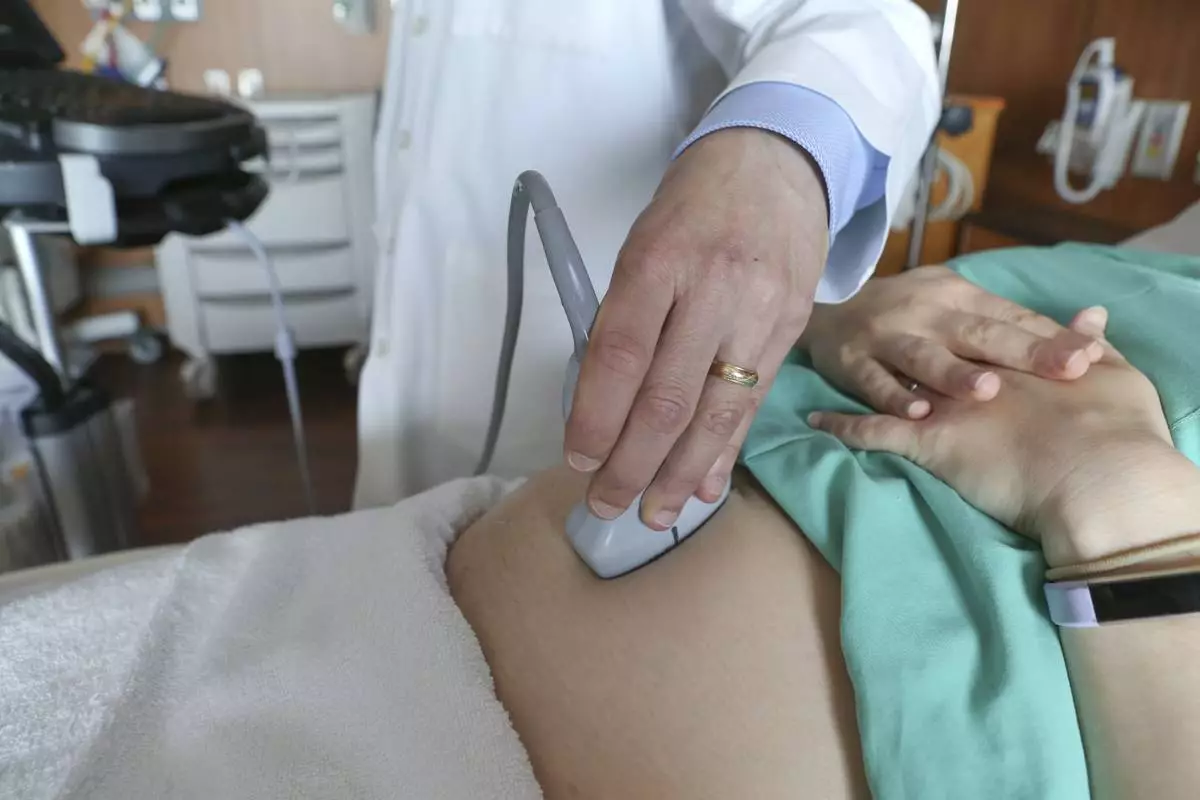
FILE - A doctor performs an ultrasound scan on a pregnant woman on Aug. 7, 2018, at a hospital in Chicago. Complaints about pregnant women being turned away from emergency rooms spiked in the months after states began enacting strict abortion laws following the 2022 U.S. Supreme Court decision overturning Roe v. Wade. The cases are detailed in federal documents obtained by The Associated Press and raise serious questions about the state of emergency pregnancy care in the U.S. (AP Photo/Teresa Crawford, File)
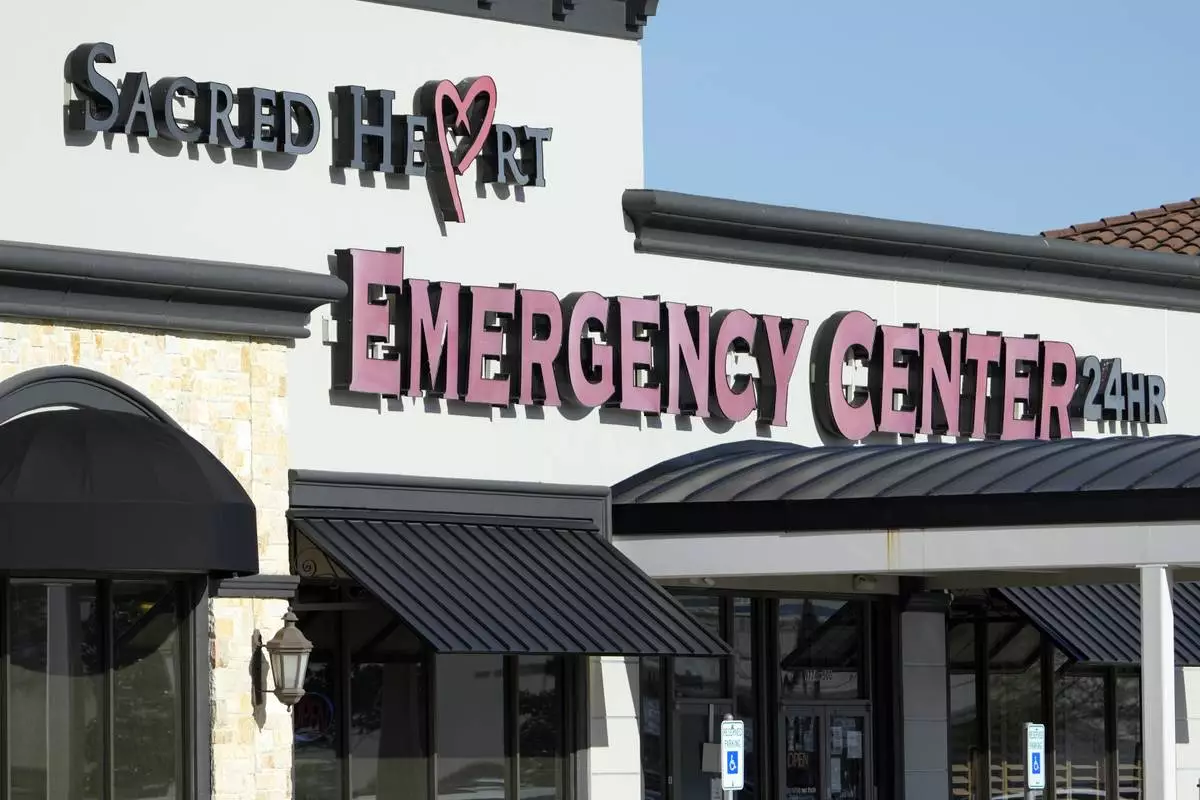
Sacred Heart Emergency Center is pictured Friday, March 29, 2024, in Houston. Complaints about pregnant women being turned away from emergency rooms spiked in the months after states began enacting strict abortion laws following the 2022 U.S. Supreme Court decision overturning Roe v. Wade. At Sacred Heart Emergency Center in Houston, front desk staff refused to check-in one woman after her husband asked for help delivering her baby. She miscarried in a restroom toilet in the emergency room lobby while her husband called 911 for help. (AP Photo/David J. Phillip)
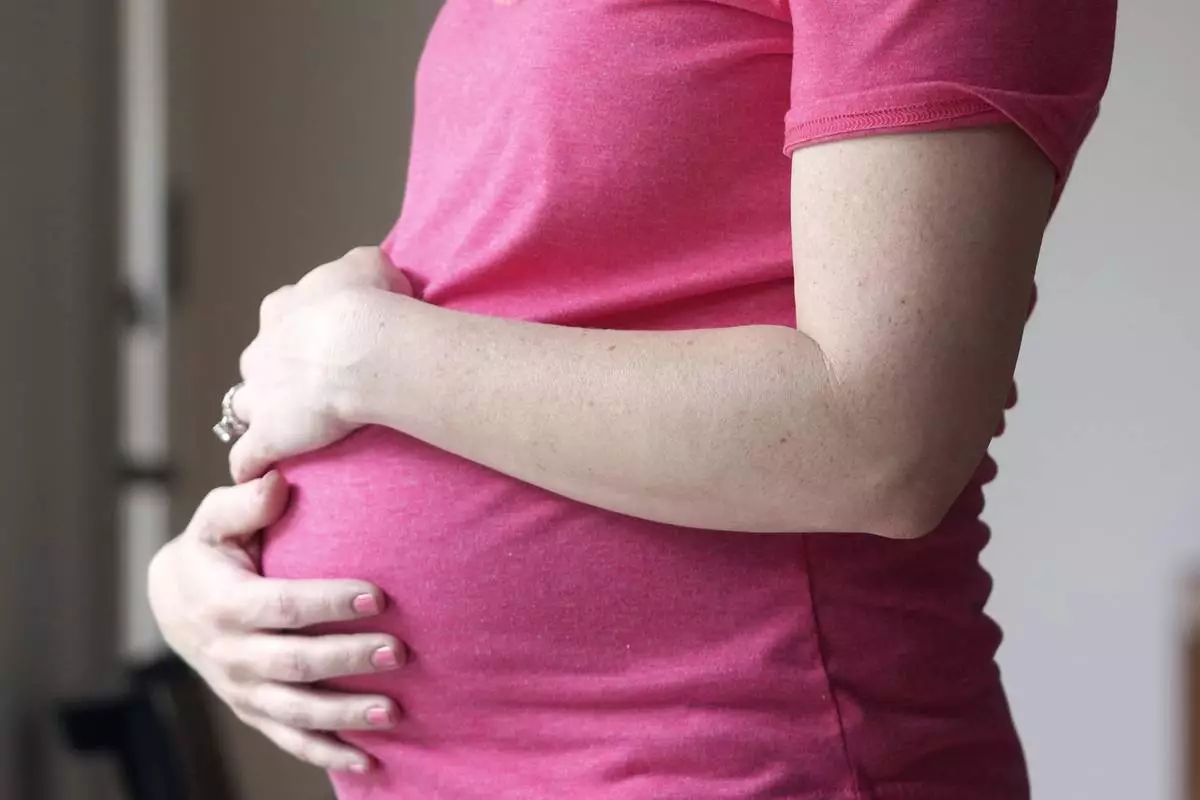
FILE - A pregnant woman stands for a portrait in Dallas, May 18, 2023. Complaints about pregnant women being turned away from emergency rooms spiked in the months after states began enacting strict abortion laws following the 2022 U.S. Supreme Court decision overturning Roe v. Wade. The cases are detailed in federal documents obtained by The Associated Press and raise serious questions about the state of emergency pregnancy care in the U.S. (AP Photo/LM Otero, File)
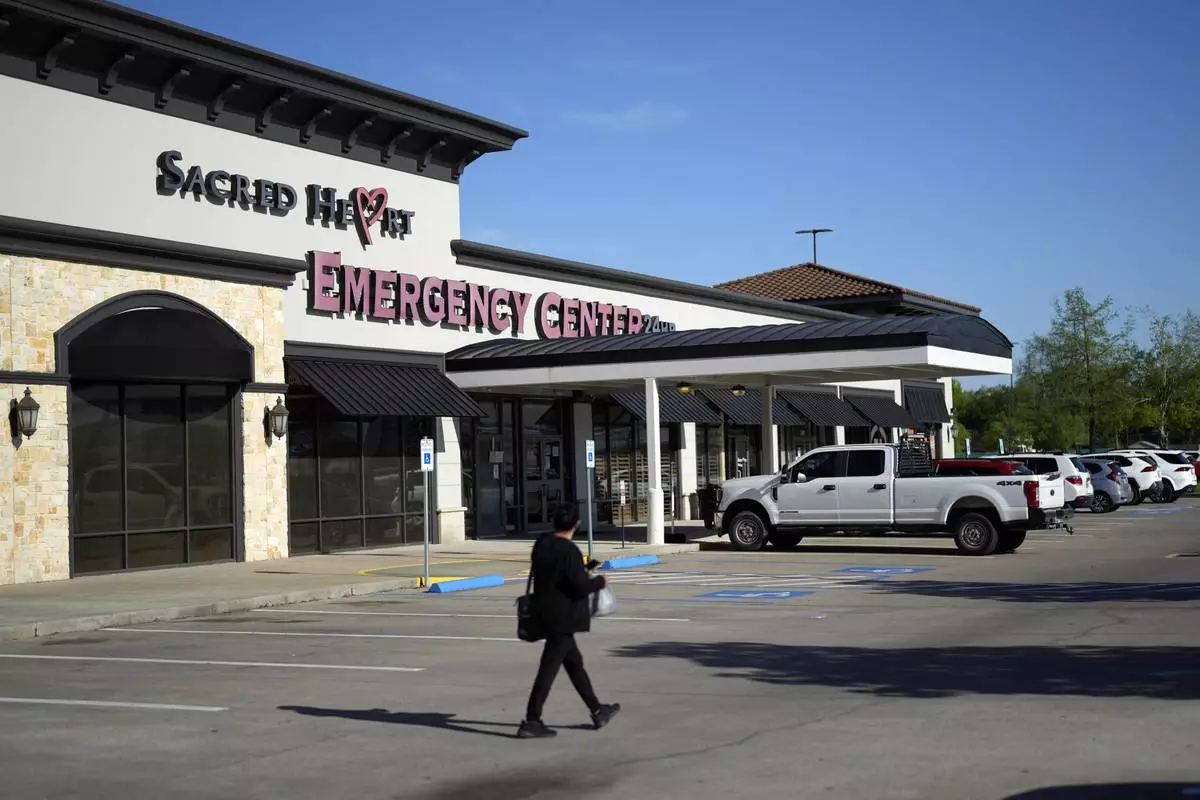
Sacred Heart Emergency Center is pictured Friday, March 29, 2024, in Houston. Complaints about pregnant women being turned away from emergency rooms spiked in the months after states began enacting strict abortion laws following the 2022 U.S. Supreme Court decision overturning Roe v. Wade. At Sacred Heart Emergency Center in Houston, front desk staff refused to check-in one woman after her husband asked for help delivering her baby. She miscarried in a restroom toilet in the emergency room lobby while her husband called 911 for help. (AP Photo/David J. Phillip)






















